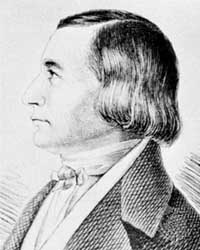
Johann
Eckermann (1792-1854)
German writer, best known for his Conversations with Goethe (3 vols.,
1836-48).
Biographies E
|
Johann
Eckermann (1792-1854) |
|
Meister
Eckhart (1260-1327) |
|
Irwin
Edman (1896-1954) |
|
Jonathan
Edwards (1703-1758) |
|
King
Edward VII (1841-1910) |
|
Albert
Einstein (1879-1955) |
|
Mircea
Eliade (1907-86) |
|
Elijah |
|
George
Eliot (1819-80) |
|
Ralph
Waldo Emerson (1803-1882) |
|
|
|
M. C.
Escher (1898-1972) |
|
|
|
Leonhard
Euler (1707-83) |
|
Euripides
(480-406) |
|
Edward
Evans-Pritchard (1902-1973) |
|
Evodius
(died 64-67). |